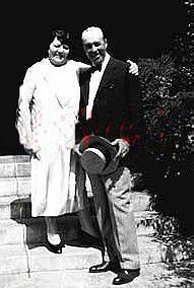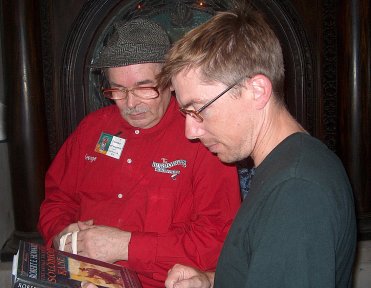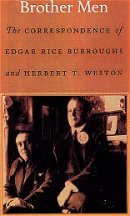You mention being in a rut. That to my mind is definitely the most
soul satisfying place to be in all the world. I love a rut.
If I were alone in the world I would dig one so god-damned deep that people
would have to use binoculars to find me at the bottom.
Burroughs to Weston (1)
I knew there was some reason other than
Tarzan I loved this guy. Yes, sir! Change in the weather, change
in the sea, but there ain't never no change in me. If you call that
a rut, fine, but I'm with ERB. Change is for the changeable, I know
where I'm headed and I'm moving on. This guy Burroughs had his head
screwed on! Check this as ERB contemplates the possibility of war
in 1940. ERB quite rightly understood that defensive wars could not
be won. You have to inflict punishment or sooner or later you must lose
if you have only a defense. The man was on a winning football team;
I'm sure he knew the importance of a good offence.
What should we do? We don't want to fight an offensive war, but we
should prepare ourselves to do so. We should prepare as though we
intended to conquer the world, but we should confine our operations to
the Western Hemisphere. If anyone says "Boo!" to us over here, we
should land on him with both feet and conquer him. I mean Mexico,
Ecuador, Bolivia or any Western Hemisphere country that gets out of line.
If we discover that fifth column infiltration has made any country a menace
to us, we shouldn't stand on ceremony or international law or ethics- we
should just wipe that country off the face of the earth. That is
what Hitler does; that is what Stalin does; that is what the hod-carrier
in Rome does. That is the international order of the day, the only
difference being that they don't have any legitimate excuse for what they
do. (2)
And while ERB was on a roll in this letter
to Weston of 6/27/40 he confirmed my good opinion of him by adding this:
You're goddam right, the horse and buggy days were the best! What
we didn't know about, we didn't miss. We didn't have Brain Trusters,
New Deals, Hitlers, Stalins, Mussolinis, Jim Farley or FDR. (3)
Taking care of the political situation he moved
on to the social:
We didn't know when we were well off. We got along very well with
one horse open sleighs; Annie Rooney, Anna Held, E.H. Southern, Lillian
Russell, Charles Dana Gibson, Graustark, and Jerome K. Jerome. Twenty-five
miles an hour was too fast and Western Union wasn't fast enough. (4)
Rah, rah, rah, Correspondence School.
Go get 'em ERB. There may never be a change in ERB and me but time
steps smartly along; nevertheless all his beliefs and sentiments are sound.
There should have been some way to avoid the Hitlers, Stalins, Mussolinis
and FDRs but there wasn't.
Then just as now the equivalents of the Saudi
Princes, Bin Laden and the international gang of fanatics keep popping
up. ERB had the right idea: there is no use talking to them;
just step on them- eat them up, stamp them flat.
With guys like the editor, Matt Cohen and his
homosocial gatherings we don't have to worry about such a correct response
being taken. The academic crowd is for a long defensive war which
can't be won, as ERB so accurately knew.
This collection of letters which so fortunately
came into the hands of Matt Cohen through his relatives is very fortuitous.
Fortunately Mr. Cohen knew what he had. Equally fortunate is the
fact that Mr. Cohen believes in minimal editing. He didn't correct
spelling, punctuation or make 'minor emendations' and 'slight revisions',
forms of bowlderizing which destroy the nuances of meaning of the writers.
We thank him for having a cool and level head in this respect. We
have no quarrel with the legacy he handed to us, however, he appended an
introduction which gives us pause.
As a member of academia he is infected with
all the viruses the academic world is subject to. All those quasi
liberal causes the academics associate with 'progressivism' - collectivity,
homosexuality philo this and philo that. Then if one doesn't agree with
these prejudices they defame you as a bigot who should be exiled from society.
I associate these attitudes more with prejudices than I do with liberalism
or progressivism. What's so liberal about collectivism? Tell
me, I'm listening.
Mr. Cohen himself is or was researching male
sexuality in the nineteenth century. That's a broad enough subject
as to defy synthesis. As Mr. Cohen explains in his conversation with
his Gmom: After I had finished describing some of the more entertaining
parts of my research - on men's lives in the bachelor hotels that began
to proliferate in the Golden Age... (5)
That must be where Mr. Cohen came up with the
concept of 'homosocial' get-togethers. Bachelor hotels may be a place
to start when you're 'working the last stages
of a dissertation about bachelors in America and deeply interested in the
complicated relationships among emotions, economics, and identity in men's
lives in the nineteenth century.' (6) but one feels that
Mr. Cohen has narrowed his field impossibly as have most academic dissertations
which attempt to encompass large fields in narrow prejudices, investigations
that seem to reflect a preconceived notion of reality rather than an examination
of the facts. As Freud would say: a projection of inner
wishful thinking onto objective reality.
Contrast his quote from R.L. Stevenson
with which Zane Grey prefaces his novel 'The U.P. Trail':
. . . When I think
how the railroad has been pushed through the unwatered wilderness and haunt
of savage tribes; how at each stage of the construction roaring impromptu
cities, full of gold and lust and death, sprang up and then died away again,
and are now but wayside stations in the desert; how in these uncouth places
Chinese pirates worked side by side with border ruffians and broken men
from Europe, gambling, drinking, quarreling, and murdering like wolves;
and then when I remember that all this epical turmoil was conducted by
gentlemen in frock coats, with a view to nothing more extraordinary than
a fortune and a subsequent visit to Paris- it seems to me as if this railway
were the one typical achievement of the age in which we live, as if it
brought together into one plot all the ends of the world and all the degrees
of social rank, and offered to some great writer the busiest, the most
extended, and the most varied subject for an enduring literary work.
If it be romance, if it be contrast, if it be heroism that we require,
what was Troy to this. (7)
Men's bachelor hotels may be a place to look
at homosocial relationships between men but just how typical are they.
Stevenson's environment is the America Burroughs, Weston, Grey, London
and the whole generation came to maturity in and their writing reflects
male relationships is a broader arena than the public toilets of bachelor
hotels.
Consider Burroughs' character of John Carter Of Mars.
Is he based on homosocial relationships in public toilets? No.
What is his career on Mars but H.M. Stanley's transposed from nineteenth
century Africa. Stanley is the sort of man who fired the imaginations
of men like Burroughs not some homosocial gathering in bachelor hotel restrooms.
While Mr. Cohen has his way of evaluating things
I doubt if any of his notions figured into the thinking Burroughs and Weston.
On page 31 Mr. Cohen writes:
Weston and Burroughs were, of course, products of a racialized nation.
As Middle class men with families and multiple businesses, they invested
in the racism and classism that helped their families get leverage before
they were born. We should nevertheless keep sight of the fact that
racism and classism are learned, and are revised or sometimes even rejected
over the course of a lifetime. Both men's writings include evidence
of the stresses and contradictions that racialism forced into their imagination
of what it meant to be a man.(8)
I am at a loss to understand what exactly Mr.
Cohen means by saying that Burroughs and Weston were the products of a
racialized nation who 'invested' in the racism and classism that helped
their families 'get leverage' before they were born.
To me this is a totally distorted way of looking
at reality. The nation today is no less racialized than it
ever has been; it is merely being organized along different racial attitudes
no less prejudiced than those by which Mr. Cohen characterizes the
time under discussion. We are all still products of a racialized
nation be we White, Black, Christian, Jewish, Moslem, Chinese or, god forbid,
Scientific and above these prejudices.
One must believe that Mr. Cohen is still living
in the twentieth century not yet having adapted to current realities.
He still thinks of non-Whites as 'minorities' much as the citizens of Toronto
speak of 'visible minorities' meaning, one imagines, non-Whites.
The 'visible minorities' already make up over fifty percent of Toronto's
population while incoming immigrants are almost all 'visible minorities'
so that in the matter of a couple years if the Whites of Toronto wish to
see a member of a visible minority all they will have to do is look in
the mirror.
This is the twenty-first century reality which
makes Mr. Cohen's racism or racialism already out of date. Certainly
Burroughs and Weston growing up when they did had the confidence natural
to a species which had brought mankind out of barbarism while having produced
men like H.M. Stanley and Cecil Rhodes who were able to perform astonishing
feats, in Stanley's case almost single-handed in the most hostile of environments.
Stanley was a minority of one in Africa while
ERB's John Carter is a minority of one on Barsoom. He was everywhere
easily identifiable by his white skin as was Stanley in Africa. When
Carter wished to go incognito he had to smear a red coloring on much as
white minstrels smeared on burnt cork so as to pass as Blacks on stage.
There were racial realities in Burroughs and
Weston's time as there are today but I would question Mr. Cohen's conclusion
that they 'invested' in racism and classism. Except for a few chance
references by Mr. Weston to Negroes the subject does not seem to enter
into their conscious thought processes.
Nor does classism enter into their thinking.
Quite frankly classes do not enter into American thinking. As Stevenson
notes there are social ranks which is quite true and inescapable.
There are those who are more and those less successful, there are differences
in education and aspirations. The hobo is not necessarily at the
economic bottom because he hasn't had chances but because he hasn't availed
himself of the chances he has had. He prefers a life on the road
to applying himself to tasks which are largely boring and tedious including
academia and other so called easy brain work such as writing this.
Prep work is always tedious and boring; the prep that goes into this is
no less so but necessary. The hobo won't do it.
If I may so 'white skin privilege' doesn't have much to
do with anything either. Only a small percentage of the white population
has ever enjoyed 'white skin privilege' including, I suspect, Mr. Cohen.
The rest of us had to bust it or go under. Nobody gave the majority
of us anything.
So putting either Burroughs or Weston into
racial or class slots is a very inaccurate mode of evaluation. It
merely bares one's prejudicial way of looking at society. Along with
those academic prejudices Mr. Cohen also displays the Marxist prejudice
when he identifies the two men with Fascism.
Such a prejudicial charge isn't worth the breath
it takes to deny it. Burroughs himself expressed the 'American' point
of view as clearly as anyone can when he said that 98% of Americans considered
Communism and Fascism/Nazism as foreign ideologies, which was and is quite
true. To call any but a small fringe of Americans Fascists or Nazis
is to completely misunderstand the American character. Most of those
who make such charges usually come from a Red/Communist background. Communism
was made up mainly of 'immigrants' or foreigners so their opinion of
'Americans' shouldn't be taken too seriously.
In concentrating on such academic ideological
prejudices Mr. Cohen did a great injustice to the real value of the correspondence
to Bibliophiles which after all is the audience for this book.
The obvious interest of both men in cars and
their opinions on them is much more noteworthy than their 'racism and classism.'
Cords, Lincolns and Packards are always noteworthy conversational fodder.
Their attitudes towards Ford's retooling that resulted in the Model A V8
was of some interest. You could give that a Marxist interpretation
but...
The homosocial occasion of ERB's breakup with
Emma might have received a smidgeon of attention from Mr. Cohen in his
introduction. After all Mr. Weston knew both parties to the divorce
very well. It is interesting that he sided with Emma breaking off
a life long relationship with ERB over it, which lasted for five years
before the 'homosocial' relationship between the two was reaffirmed.
During that period it is of interest that Weston and his wife Margaret
maintained a relationship with Emma.
Weston's letter in which he denounced ERB as
a difficult fellow for Emma to get along with and saying that he was always
somewhat of a queer fellow who was always saying off the wall things may
be a side of ERB that he ignored, I mean, anyone who can write
The Mastermind
Of Mars and Synthetic Men Of Mars is bound to get in an off
the wall comment from time to time, until the divorce when it may have
been influenced by the disparity in their relative social and economic
positions.
Even though the two families try to maintain
a facade of economic equality, one has the feeling that Burroughs is being
very careful to not appear too wealthy or famous which surely would have
blighted the relationship. Thus his frequent references to Weston
as one of the 'plutes' or plutocrats, men of means, is meant to maintain
the appearance of equality although Burroughs rather eccentric lifestyle
was surely very obviously a costly one.
Perhaps a subtle change in the relationship
came when the MGM Tarzan films hit the screen. These were apparently
phenomenal successes along the lines of the Star Wars series of our day.
Everyone saw them. Thus the facade of equality was breached as it
was no longer possible for Weston to ignore that his friend was in fact
a major celebrity of global proportions.
 This realization may have been very difficult to take which may have contributed
somewhat to his rejection of ERB over the divorce with Emma. He may
have believed that ERB's fame had divorced him from their friendship.
This realization may have been very difficult to take which may have contributed
somewhat to his rejection of ERB over the divorce with Emma. He may
have believed that ERB's fame had divorced him from their friendship.
Altogether the correspondence from 1926 to
1934 when the breach in friendship occurred is of great interest to Bibliophiles.
We also learn that in 1929 Emma's mother did visit the family in Los Angeles.
I would recommend the correspondence for at
least one read but a second or third might provide a much deeper insight
into ERB's character. Altogether both men came off very well.
Mr. Cohen is to be commended also for his minimal
editing of the letters. While I find his introduction a melange of
irrelevant academic prejudices I much applaud his good sense in letting
the letters stand as is.
So I thank Mr. Cohen for making the correspondence
available

Matt Cohen with George McWhorter
ERB
Museum at Pleasant Home, Oak Park, Illinois




![]()
![]()
![]()
![]()

![]()